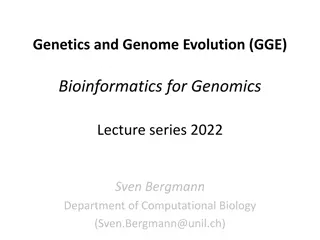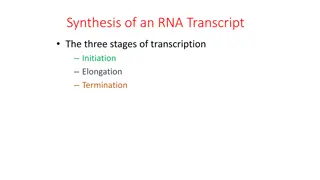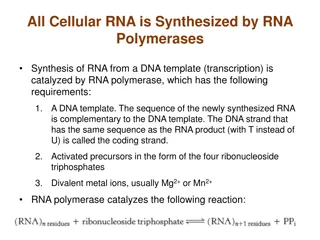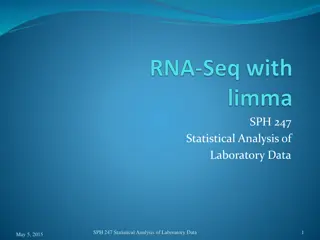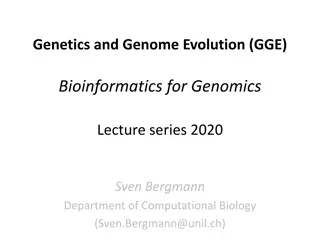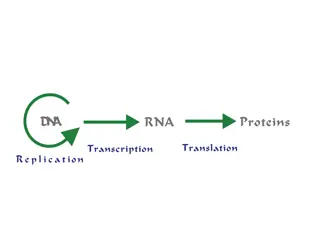Understanding the Tophat2 RNA-seq Pipeline
Tophat2 is a versatile pipeline aimed at aligning RNA reads to a genome, addressing gaps in alignments through innovative strategies. It involves the use of Bowtie for mapping and is written in C++, with a Python wrapper for seamless execution. The pipeline deals with large datasets and requires various prerequisites such as zlib, Boost, and samtools. Users have reported varied run times on different systems, showcasing both efficiency and challenges associated with parallel processing. Additionally, efforts have been made to profile the code for optimization using tools like gprof and vtune, albeit with some difficulties.
Download Presentation

Please find below an Image/Link to download the presentation.
The content on the website is provided AS IS for your information and personal use only. It may not be sold, licensed, or shared on other websites without obtaining consent from the author. Download presentation by click this link. If you encounter any issues during the download, it is possible that the publisher has removed the file from their server.
E N D
Presentation Transcript
Tuning Tophat2 Belinda Giardine
Tophat2 Aligns reads from RNA to the genome Ribonucleic acid (RNA) is a ubiquitous family of large biological molecules that perform multiple vital roles in the coding, decoding, regulation, and expression of genes. Adds on dealing with gaps in the alignments by breaking the reads into small pieces ~20 bases and reassembling the reads after mapping. Though the new version is more parallel still slow (more than 4 days for recent runs) It uses Bowtie to do the actual mapping
RNA-seq image from wikipedia fastq file, a single read: @DGM97JN1:330:C3EW0ACXX:1:1101:2723:1993 1:N:0:NAAGGC GAATGCCCCCGGCCGTCCCTCTTAATCATGGCCTCAGTTCCGAAAACCANCAAAATAGAACCGCGGTCCTATTNN + CCCFFFFFHHHHGIIFGIIIIJJIIJIFGIJEHIIJIGHIJHAGHHFEE#,;;BACEEDDDDDD@B>BBDCDC##
Tophat2 Pipeline written in C++ (34,351 lines of code in 63 files) Wrapper written in Python 3 of the programs use Boost pthreads long_spanning_reads.cpp segment_juncs.cpp tophat_reports.cpp Programs are compiled as one unit under autoconfig and automake, communication between programs with temporary files. Many prerequisites: zlib, Boost, samtools, Bowtie, this and the amount of file IO makes running on MIC only not feasible.
Data files Reads in fastq format, 20 200 million reads (2 x 20gb for my test) Reference sequence and indexes used for mapping 6gb for mouse Final output 14gb for my test
Work from last time Compiling start with gcc then icc then add mmic (this failed in trying to get all the prerequisites) Test run on host, using Tophat s log of run for time. Run on biostar(Xeon) using 8 threads took 26 hours Run on stampede (host) using 16 threads took 19 hours, 40 mins Run on stampede (host) using 32 threads took 24 hours
New work Python wrapper and long run times makes gprof and vtune difficult to profile code with. Going from my experience in Biostar, I am starting with segment_juncs executable. Keeping the temporary files that are used for passing data between programs, I ran just segment_juncs. Time for segment_junctions run alone: 8 threads 2 hours 13 minutes 16 threads 1 hour 15 minutes (2 out of 19 hours total) of this 76% is spent in the parallel section 32 threads 2 hours 12 minutes
Failed attempts Run vtune on segment_juncs times out of full data license errors Check loops in par_report that are assumed dependencies. lines of code indicated not loops or in loops? contradictory lines Offloading threaded section of code in segment_juncs.cpp. Will it actually improve speed or too much file IO? Lots of variables to copy File IO
vec_report3 segment_juncs.cpp(135): (col. 32) remark: loop was not vectorized: existence of vector dependence. segment_juncs.cpp(135): (col. 32) remark: vector dependence: assumed ANTI dependence between r.92068 line 135 and r.92068 line 135. segment_juncs.cpp(135): (col. 32) remark: vector dependence: assumed FLOW dependence between r.92068 line 135 and r.92068 line 135. Line 135: left_seg.left = max(0, T.right() - 2);
opt_report REMOVED VAR left_mismatches.201433.0_V$78b REMOVED PACK left_mismatches.201433.0 REMOVED VAR right_mismatches.201433.0_V$78d REMOVED PACK right_mismatches.201433.0
gprof output for segment_juncs Each sample counts as 0.01 seconds. % cumulative self self total time seconds seconds calls Ts/call Ts/call name 100.01 0.01 0.01 extend_from_seeds(std::vector<SeedExtension, std::allocator<SeedExtension> >&, PackedSplice const&, std::vector<std::vector<ReadHit, std::allocator<ReadHit> >, std::allocator<std::vector<ReadHit, std::allocator<ReadHit> > > > const&, std::string const&, std::string const&, unsigned long, unsigned long, int) 0.00 0.01 0.00 89528 0.00 0.00 pack_splice(std::string const&, int, int, unsigned int) 0.00 0.01 0.00 3 0.00 0.00 __do_global_dtors_aux 0.00 0.01 0.00 2 0.00 0.00 pack_right_splice_half(std::string const&, unsigned int, unsigned int)
Parallel section of code: vector<boost::thread*> threads; for (int i = 0; i < num_threads; ++i) { SegmentSearchWorker worker; worker.rt = &rt; worker.reads_fname = left_reads_fname; worker.segmap_fnames = &left_segmap_fnames; worker.partner_reads_map_fname = right_reads_map_fname; worker.seg_partner_reads_map_fname = right_seg_fname_for_segment_search; worker.juncs = &vseg_juncs[i]; worker.deletions = &vdeletions[i]; worker.insertions = &vinsertions[i]; worker.fusions = &vfusions[i]; worker.read = READ_LEFT; worker.partner_hit_offset = 0; worker.seg_partner_hit_offset = 0; if (i == 0) { worker.begin_id = 0; worker.seg_offsets = vector<int64_t>(left_segmap_fnames.size(), 0); worker.read_offset = 0; } else { worker.begin_id = read_ids[i-1]; worker.seg_offsets.insert(worker.seg_offsets.end(), offsets[i-1].begin()+1, offsets[i-1].end()); worker.read_offset = offsets[i-1][0]; if (partner_offsets.size() > 0) worker.partner_hit_offset = partner_offsets[i-1]; if (seg_partner_offsets.size() > 0) worker.seg_partner_hit_offset = seg_partner_offsets[i-1]; } worker.end_id = (i+1 < num_threads) ? read_ids[i] : std::numeric_limits<uint64_t>::max(); //Geo debug: //fprintf(stderr, "Worker %d: begin_id=%lu, end_id=%lu\n", i, worker.begin_id, worker.end_id); if (num_threads > 1 && i + 1 < num_threads) threads.push_back(new boost::thread(worker)); else worker(); }


